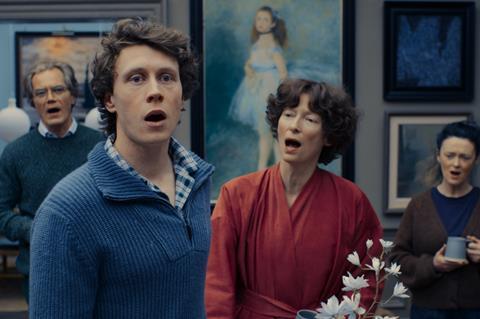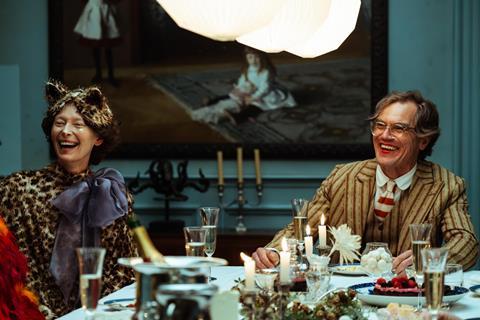‘The End’ stars Tilda Swinton and George MacKay and had its world premiere at Telluride.

In his Oscar-nominated 2012 documentary The Act Of Killing, Joshua Oppenheimer challenged perpetrators of the 1965 genocide in Indonesia to re-enact the mass killings, following up in 2014 with companion film The Look Of Silence, which also sought to hold those offenders accountable for their bloody actions.
In his first feature since, Oppenheimer spins an end-of-days story in the shape of a Golden Age musical set 25 years after a climate-induced apocalyptic event. It follows the last surviving family – partly responsible for the world’s demise – as they hide in an underground bunker. Tilda Swinton, George MacKay, Michael Shannon and Moses Ingram star in the film, which premiered at Telluride and plays in Toronto as a Special Presentation.
Oppenheimer describes The End as “a direct descendant of The Act Of Killing and The Look Of Silence”. His original intention had been to make a third documentary about the oligarchs who profited from the Indonesian genocide but, unable to return safely to the country, he shifted focus to a family of oil tycoons, who told him about their plan to build a lavish doomsday bunker.
“I imagined the horror of being alone in the abyss of meaninglessness, when the broader human family is gone and you’ve saved only a fragment of your own family,” says the Texas-born filmmaker. “And how they would live, try to find purpose and cope with the remorse of being implicated in such a catastrophe.”
After that meeting in 2016, Oppenheimer watched Jacques Demy’s 1964 musical The Umbrellas Of Cherbourg in an attempt to cleanse his mind, a “break” that sparked the idea to make a musical set in a post-apocalyptic world.
Oppenheimer’s research for the project took him to survival bunkers from disused nuclear missile silos in Kansas, as well as numerous salt mines and caves in Germany and Italy. “One of the reasons we built the film as a German and Italian co-production was because we knew they had the most extraordinary salt mines,” he explains.
From there, the film expanded into a multi-territory co-production that was eight years in the making. Neon co-financed the international co-pro with partners from Denmark, Germany, Ireland, Italy, the UK and Sweden.
Oppenheimer produces with Swinton and Final Cut for Real’s Signe Byrge Sorensen; Neon releases in North America and The Match Factory handles international sales.
Casting chemistry
When it came to actors, Oppenheimer says Swinton was always his first choice to play Mother, the matriarch of the uberwealthy, allegorical family who exist in a state of forced frivolity that is disrupted when Girl (Ingram) enters their bunker from the outside world. The UK actress was not available initially but when the two eventually spoke, “there was an immediate rapport and deep respect – at the end of that call, she said, ‘Well, we’re doing this.’”

Sam Mendes put him in touch with George MacKay, who quickly signed on as Boy, and Ingram, Shannon and the rest of the cast followed suit.
As well as its talent roster, the film is a patchwork of production partners that includes Mendes, Werner Herzog, Ramin Bahrani and James Marsh as executive producers.
“People creatively came on board as I needed in my journey,” explains Oppenheimer. Herzog, for instance, “is a dear friend who helped wrangle the budget into something more achievable and even spent his 80th birthday doing so”, while Mendes used his experience in directing stage musicals to share “wonderful ideas for how to structure rehearsal when working with non-singers”.
The final budget came in at around $17.7m (€16m) and Oppenheimer attributes the complexity of the credits to post-Covid inflation “which caused the budget to go beyond what the European co-production system could support, so some of the partners were brought in to keep the film alive when costs were rising ahead of the shoot”.
The director co-wrote the script with Danish screenwriter Rasmus Heisterberg (A Royal Affair); he also wrote the lyrics for the film’s 13 original songs, composed by Josh Schmidt, with Marius de Vries serving as executive music producer.
While The Act Of Killing featured a couple of musical numbers, Oppenheimer says his first narrative film was “a big learning curve”. A filmmaker who has confronted genocidal murderers describes writing lyrics as “terrifying… It seemed like the hardest thing in the world. When Josh told me sometimes they should rhyme, I was utterly horrified.
“I remember taking hikes with my husband and saying, ‘I can’t do this’,” he continues. “He’d say, ‘Try and make everything you say to me rhyme.’ So we would chatter away and I’d try to make everything rhyme as I talked about everything that was on my mind.”
He and Schmidt eventually found ways to thread songs into the score, including tunes focused on inner monologues that “give the viewer an invitation to inhabit the characters as they try to convince themselves of fictions, fantasies and lies”.
Production
From there, the cast headed to Ardmore Studios in Bray, Ireland for a four-week rehearsal period in early 2023 with choreographers Sam Pinkleton and Ani Taj and cinematographer Mikhail Krichman to plot each scene before the sets were designed with Melancholia production designer Jette Lehmann.
Principal photography kicked off at Ardmore in March, then in Germany and Italy both in studios and on location including at salt mines in Sicily and Thuringia. The score was recorded with Film Orchestra Babelsberg in Berlin in February this year.
All of the singing in the film is live. “Tilda uses takes as a playground and gets deeper and deeper,” says Oppenheimer. “I gave her 31 takes [for Mother’s key aria] and it’s her 31st take that is the most extraordinary out of 31 exquisite takes.”
While The End taps into the darker side of humanity, Oppenheimer also says: “It is founded on the hope we can change. While it might be too late for the world’s last family, it’s not too late for the audiences even as we are heading towards environmental catastrophe and potentially human extinction. There is still time for us to face our painful truths, accept them and change course collectively as a human family.”
“It’s a cautionary tale,” he adds. “But you only create a cautionary tale if you’re a die-hard optimist. So no, I’m not building a bunker.”

























No comments yet